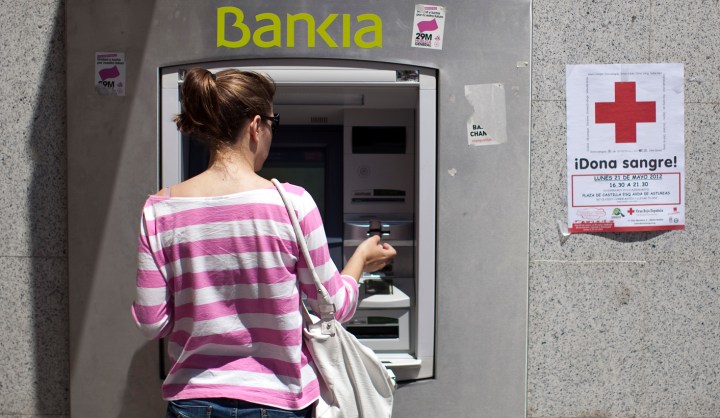Business Maverick, Newsdeck
Spanish bank audits to get international scrutiny

International institutions will oversee an audit of Spain's banks aimed at reassuring investors that bailout costs will not spiral as the prospect of new Spanish borrowing threatens to further inflame the euro zone crisis. By Paul Day and Tracy Rucinski
Spain’s weak banks and overspending regions are central to the European debt crisis as many investors believe the government will only be able to support them by seeking international aid.
Spain announced a bailout of at least 9 billion euros ($11 billion) and full state takeover for troubled lender Bankia on Wednesday. Meanwhile, officials debated how to back regions that must refinance 36 billion euros this year.
A government source said the European Central Bank and International Monetary Fund would oversee an external audit aimed at easing concerns over the health of the banking sector. The source said full details were yet to be decided.
“You have to include them in a way because there is a significant amount of distrust placed by investors on figures provided by the Bank of Spain and the Treasury,” Citi economist Guillaume Menuet said.
“It’s a bit of a double-edged sword, though, because if the figures turn out to be too optimistic it hurts their credibility.”
Four stages of banking reforms have failed to convince investors that the financial sector has fully accounted for losses from a 10-year property boom that burst in 2007-2008.
The aim of the external audits, due to be completed by mid-June, is to put a definitive number on how much the government might have to spend to shore up banks after forcing them to recognise 137 billion euros in losses.
The government named consultancies Oliver Wyman and Roland Berger to audit the banks from the top down and look at how they would weather a prolonged recession. Three or four other firms will examine bank books and real estate holdings from the bottom up.
Premiums on Spanish debt, as measured by the spread between Spanish and German benchmark bonds, have jumped to euro era highs in the last week after the government stepped in to rescue Bankia, which holds some 10 percent of retail deposits.
The risk premium moved up to more than 492 basis points on Thursday before falling back to about 480 .
Apart from bailed out Greece, Portugal and Ireland, Spain has underperformed all euro zone governments in debt markets this year as the prospect of new borrowing has risen.
“The risk is quite high that Spain will need outside help, at least on the recapitalisation side,” said ING rate strategist Alessandro Giansanti.
ECB MEDICINE
In a meeting with European leaders on Wednesday night, Prime Minister Mariano Rajoy pushed for rapid European Central Bank intervention – such as bond buying on secondary markets – to bring down Spain’s borrowing costs. But he got no firm commitments..
He stressed that he was not requesting ECB aid for Spanish banks, which would imply a rescue for the sovereign.
Spain has outlined budget savings of some 45 billion euros, including around 18 billion euros from the regions, to cut one of the highest public deficits in the euro zone from 8.9 percent of gross domestic product last year to 5.3 percent this year.
Since the economy dipped back into its second recession in three years, economists see the target as ambitious at best.
“We won’t make it,” Elena Valenciano, a leader of the opposition Socialist Party, told Reuters in an interview, recommending a change in the pace of budget and deficit cutting.
“We need ECB bond buying as a fever-reducer, euro bonds as an antibiotic to kill the infection and growth policies as the vitamins to return to health,” Valenciano said.
Such steps are impossible for Spain alone, however, and Germany remains strongly opposed to issuing shared euro zone bonds, which would push up its own borrowing costs.
As the predicament of Spain’s banks worsens, its politicians trade blame. Rajoy’s People’s Party (PP) accuses the Socialist-appointed Bank of Spain governor, whose term ends in July. Socialists, who lost power last year, point out that Bankia and other troubled banks were run by PP allies.
In another sign of the rising political temperature, unions protested outside parliament against labour market reforms the government says it needs to bring down 24 percent unemployment. Unions call it an attack on workers’ rights.
“Everything our parents built is going to hell, that simple. I think it’s unfair,” said Esther, a 31-year-old accountant amid the thousands of protesters waving red flags and chanting.
Demonstrators kept up protests outside Bankia offices in Madrid, holding banners that said “Return what you have hidden” and chanting “Thieves, thieves!”
Even as the banks try to sort out their problems stemming from the burst property bubble, the government has called on them to lend to the 17 autonomous regions to help them pay debts for everything from hospital workers to road sweeps.
The regions, which make up around half of total public spending and are key to Spain meeting its deficit goal, have been told they could face central government intervention in their finances if they don’t carry out cost cutting plans to reduce the shortfall.
“This puts more pressure on the banks to roll over these credit lines. In the end everything goes back to the banks in Spain, which is another reason we need resolution on the banks as soon as possible,” said Gilles Moec, economist at Deutsche Bank. DM
Photo: A woman uses a Bankia bank automated teller machine (ATM) next to a sign reading “Donate Blood” in Madrid May 18, 2012. Spanish banks’ bad loans rose in March to their highest in 18 years, underscoring the problems facing the government as it drafts in independent auditors in an attempt to reassure investors it can clean up the sector. REUTERS/Paul Hanna


















 Become an Insider
Become an Insider